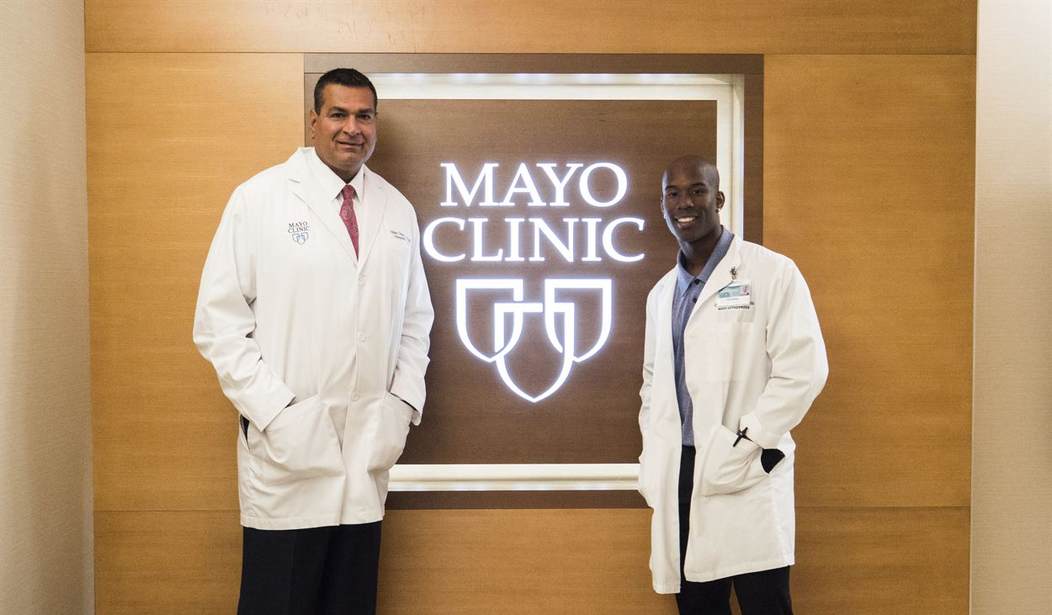I have very mixed feelings about whether a private medical institution can impose limits on the speech of its doctors, but no qualms at all about arguing that a medical degree-granting institution with academic credentials shouldn’t be allowed to muzzle its professors.
That is what is happening to Dr. Michael Joyner of the Mayo Clinic medical college, one of the premier medical schools in the world.
Dr. Joyner offended the administrators at the Mayo Clinic for dissenting from the medical school’s position that convalescent plasma is not a good treatment for a COVID infection. Joyner had been a frequent commentator on medical issues in the media, something that was encouraged by the college because it enhanced the prestige of the institution.
Treatments for disease by using convalescent plasma are not radical untried treatments along the lines of using experimental drugs made from peach pits or something. In fact, the Mayo Clinic itself has a page on convalescent plasma treatments for COVID. Dr. Joyner expressed an opinion about the use that deviated from the official position but did so making clear that he was simply speaking for himself.
The Clinic didn’t like that, and told him to shut up, despite it also proclaiming its devotion to academic freedom. On its face these statements are contradictory: You may state your opinions freely, as long as they are the same as ours.
This is how science and academia work these days.
TAKE ACTION: Tell Mayo Clinic to rescind its retaliation against @DrMJoyner and publicly reaffirm its commitment to free speech and academic freedom ➡️ https://t.co/SRsfOWyY3N pic.twitter.com/dUh1IKBuNL
— FIRE (@TheFIREorg) July 5, 2023
The Mayo Clinic has an official academic freedom policy that should empower Joyner to express his opinions, but of course such policies aren’t worth the paper they are printed on–and they rarely are printed on any paper at all these days.
Unsurprisingly, Joyner first got attention from the higher-ups at Mayo for taking a position on transgender athletes–and we all know that crosses a big red line. The Clinic, though, is insisting that his suspension from speaking to the press had to do with complaints about the NIH’s discouraging the use of convalescent plasma. You decide which is the greater sin.
The memo also claims “Mayo Clinic did not discipline Dr. Joyner for statements he made about transgender athletes,” and encourages leadership to say that Joyner was suspended “for making unprofessional comments about the National Institute of Health’s (NIH) regulation of convalescent plasma.” Gazelka helpfully clarified why the college censored Joyner, explaining that “Dr. Joyner’s comments about the NIH did not reflect the expression of a scientific or academic opinion but instead were an expression of his personal frustration with the NIH’s regulation of a therapy he had championed.”
Just so we’re clear: Mayo Clinic apparently believes upholding free speech includes muzzling faculty for criticizing a federal health agency. Perhaps medical schools don’t teach that speaking out against the government is one of the core rights protected by free speech. Whether faculty are sharing their expertise, chastising the state, or discussing other societal issues, free speech protects them when they speak in their personal capacities — which is exactly what Joyner did when talking to the media about his research.
Mayo Clinic’s treatment of Joyner illustrates precisely why fostering free speech is incredibly important at medical colleges. If doctors are afraid to share their thoughts, the public — including their patients — have reason to distrust them. Further, if universities force research faculty to toe an ideological line, the academy stifles scientific innovation.
One would imagine that dissent in medical science would be encouraged, given how fluid the state of the science is. Gold standard treatments today were once controversial and experimental, and stasis in medicine is hardly to be desired. Mayo is not claiming that Dr. Joyner is pushing quackery; he simply is, while speaking for himself, not entirely in accordance with the Clinic or the NIH. Given how often the Clinic itself is out of step with the NIH and government policies–it has a huge lobbying apparatus–you would think that they would be a bit more flexible.
his refusal to toe the party line is protected by free speech principles, which allow him to speak without administrators babysitting him. His failure to conform to the college’s “prescribed messaging” should be of no concern to the college. Faculty are not mouthpieces of their institutions. They cannot be punished at institutions that promise academic freedom and free speech merely because administrators dislike what professors say in their personal capacities.
But that is precisely why Mayo Clinic punished Joyner. Conceding that it suspended Joyner to protect its “brand and reputation,” Mayo Clinic said the quiet part out loud. And it was not content to punish Joyner for the comments he already made — it also muzzled him going forward. As part of his sanction, Joyner must “[v]et each individual media request through Public Affairs … [to] determine what topics are appropriate and are responsible for protecting Mayo Clinic’s brand and reputation” and “[c]ease engagement in offline conversations with reporters.”
In other words: Sit down and shut up. Joyner may not speak, and when he does, he must “[d]iscuss approved topics only and stick to prescribed messaging.”
None of that matters, though, when the doctor is acting in his academic capacity and speaking not for the Clinic but for himself. The Clinic’s academic freedom policy is very clear, and this is pure retaliation for his not toeing the line.
This shouldn’t happen. But in academia, that just means that it is a day ending in -day.








Join the conversation as a VIP Member